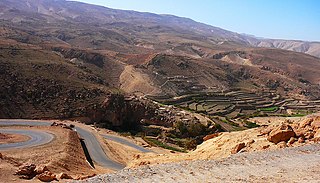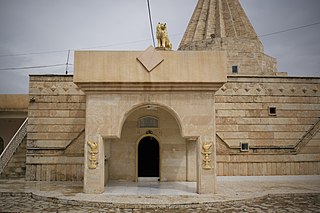Related Research Articles

Melek Taûs, also spelled Malak Tāwūs and Tawûsê Melek, translated in English as Peacock Angel, is one of the central figures of the Yazidi religion. In Yazidi creation stories, before the creation of this world, God created seven Divine Beings, of whom Tawûsê Melek was appointed as the leader. God assigned all of the world's affairs to these seven Divine Beings, also often referred to as the Seven Angels or heft sirr.

Yazidism or Sharfadin is a monotheistic ethnic religion that has roots in a western Iranic pre-Zoroastrian religion directly derived from the Indo-Iranian tradition. It is followed by the mainly Kurmanji-speaking Yazidis and is based on belief in one God who created the world and entrusted it into the care of seven Holy Beings, known as Angels. Preeminent among these Angels is Tawûsê Melek, who is the leader of the Angels and who has authority over the world.

Kurmanji, also termed Northern Kurdish, is the northern dialect of the Kurdish languages, spoken predominantly in southeast Turkey, northwest and northeast Iran, northern Iraq, northern Syria and the Caucasus and Khorasan regions. It is the most widely spoken form of Kurdish, and is the native language to some non-Kurdish minorities in Kurdistan as well, including Assyrians/Syriacs, Armenians, Chechens, Circassians, and Bulgarians.

Lalish is a mountain valley and temple in Shekhan, Duhok Governorate in Iraq. It is the holiest temple of the Yazidis. It is the location of the tomb of the Sheikh Adi ibn Musafir, a central figure of the Yazidi faith.

Yazdânism, or the Cult of Angels, is a proposed pre-Islamic Mithraic religion of the Kurds. The term was introduced and proposed by Kurdish and Belgian scholar Mehrdad Izady to represent what he considers the "original" religion of the Kurds.

Yazidis in Armenia are Yazidis who live in Armenia, where they form the largest ethnic minority. Yazidis settled in the territory of modern-day Armenia mainly in the 19th and early 20th centuries, fleeing religious persecution by the Ottoman Turks and Sunni Kurds. While Yazidis were counted as Kurds in censuses for much of the Soviet period, they are currently recognized as a separate ethnic group in Armenia. According to the 2011 census, around 35,000 Yazidis live in Armenia.
Yazidis or Yezidis are a Kurmanji-speaking endogamous minority group who are indigenous to Kurdistan, a geographical region in Western Asia that includes parts of Iraq, Syria, Turkey and Iran. The majority of Yazidis remaining in the Middle East today live in Iraq, primarily in the governorates of Nineveh and Duhok. There is a disagreement among scholars and in Yazidi circles on whether the Yazidi people are a distinct ethnoreligious group or a religious sub-group of the Kurds, an Iranic ethnic group. Yazidism is the ethnic religion of the Yazidi people and is monotheistic in nature, having roots in a pre-Zoroastrian Iranic faith.

The Sinjar Mountains are a 100-kilometre-long (62 mi) mountain range that runs east to west, rising above the surrounding alluvial steppe plains in northwestern Iraq to an elevation of 1,463 meters (4,800 ft). The highest segment of these mountains, about 75 km (47 mi) long, lies in the Nineveh Governorate. The western and lower segment of these mountains lies in Syria and is about 25 km (16 mi) long. The city of Sinjar is just south of the range. These mountains are regarded as sacred by the Yazidis.

Bashiqa is a town situated at the heart of the Nineveh plain, between Mosul and Sheikhan, on the edges of Mount Maqlub.

The main religions that exist or existed in Kurdistan are as follows: Sunni Islam, Shia Islam, Christianity, Zoroastrianism, Yarsanism, Yazidism, Alevism and Judaism.
Yazidis in Syria refer to people born in or residing in Syria who adhere to Yazidism, a strictly endogamous religion. Yazidis speak the Kurdish language of Kurmanji. Although some are scattered in Turkey and the Armenia, Iraq is the center of their religious life, the home of their Amir, and of the tomb of their most revered saint, Sheikh Adi. Yazidis in Syria live primarily in two communities, one in the Al-Jazira area and the other in the Kurd-Dagh.

The Yazidis in Turkey are a part of the Yazidis who remained in modern-day Turkey after the division of the Ottoman Empire. The Yazidis in Turkey live mainly in the south-east of Turkey.

The Yazidis in Georgia are a part of the Yazidis who fled from the Ottoman Empire due to persecution in the 19th and early 20th centuries and sought refuge in Georgia.
The Ba'athist Arabization campaigns in northern Iraq involved Arabization and ethnic cleansing of minorities, in line with settler colonialist policies, to shift the demographics of northern Iraq towards Arab domination. In 1978 and 1979, 600 Kurdish villages were burned down and around 200,000 Kurds were sent to other parts of Iraq.

The persecution of Yazidis has been ongoing since at least 637 CE. Yazidis are an endogamous and mostly Kurmanji-speaking minority, indigenous to Kurdistan. The Yazidi religion is regarded as "devil-worship" by Muslims and Islamists. Yazidis have been persecuted by the surrounding Muslims since the medieval ages, most notably by Safavids, Ottomans, neighbouring Muslim Arab and Kurdish tribes and principalities. After the 2014 Sinjar massacre of thousands of Yazidis by ISIL, which started the ethnic, cultural, and religious genocide of the Yazidis in Iraq, Yazidis still face discrimination from the Iraqi government and the Kurdistan Regional Government.
There is a social organizational structure in the Yazidi community. There are three main castes, namely the Mirids, the Sheikhs, and the Pirs. Furthermore, there are positions for dignitaries in the Yazidi hierarchy.

Mam Rashan or Mehmed Reshan was a 12th-century Yazidi saint. The Mam Rashan Shrine on Mount Sinjar was built in honor of him.

Yazidis in Iraq live mainly in the Sinjar region and the Nineveh Plains, which are located within the Nineveh Governorate in north-western Iraq.
Sultan Êzîd is a divine figure in the Yazidi religion. Although many scholars consider his name to be derived from that of the second Umayyad caliph Yazid I, many Yazidis consider him to be a separate figure unconnected to the historical Yazid I. Yazidis typically consider him to be part of a triad of divine emanations of God, though he is sometimes also considered to be identical with the angel Melek Tawus, and thus a manifestation or emanation of God.
The Feast of the Assembly is a Yazidi festival.
References
- 1 2 3 Tezcür, Günes Murat (2021-01-28). Kurds and Yezidis in the Middle East: Shifting Identities, Borders, and the Experience of Minority Communities. Bloomsbury Publishing. p. 52. ISBN 978-0-7556-0121-9.
- 1 2 Burnett, M. Troy (2020-08-04). Nationalism Today: Extreme Political Movements around the World [2 volumes]. ABC-CLIO. p. 394. ISBN 978-1-4408-5000-4.
- 1 2 "Yazidi bloc denounces Kurdistan Region approval for demolishing Yazidi religious temple". Iraqi News. 2012-08-12. Retrieved 2021-12-31.